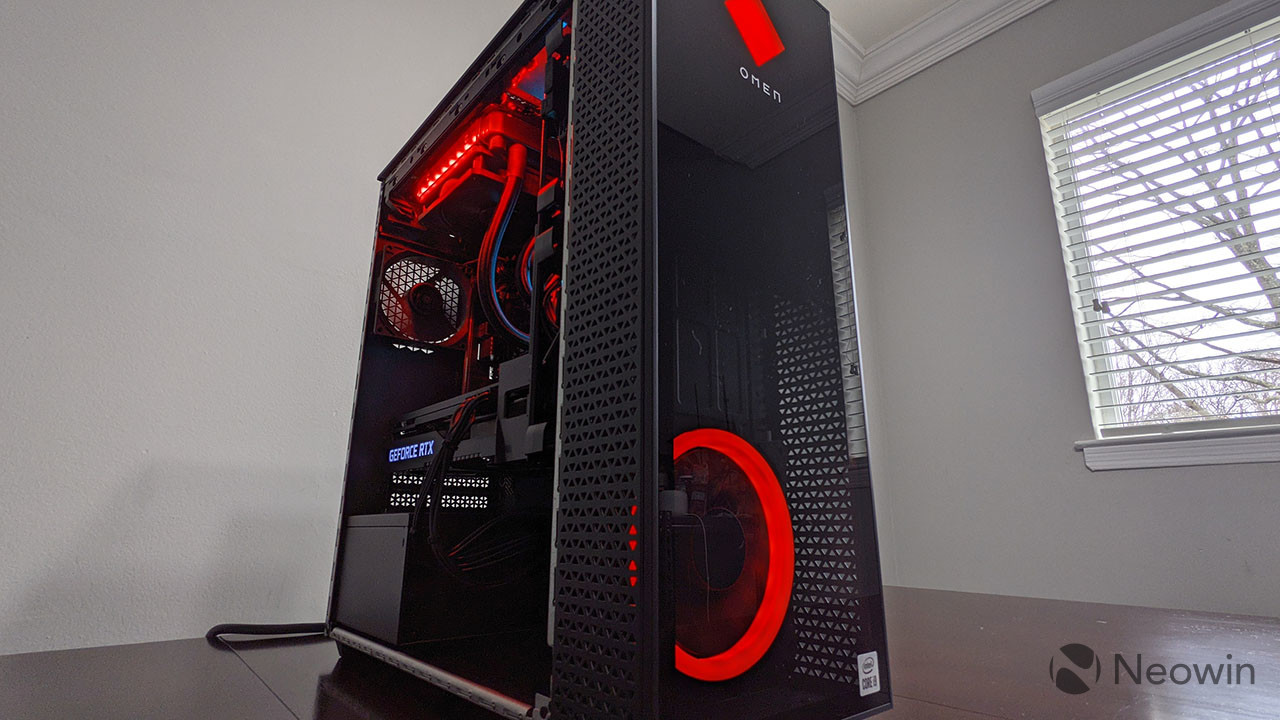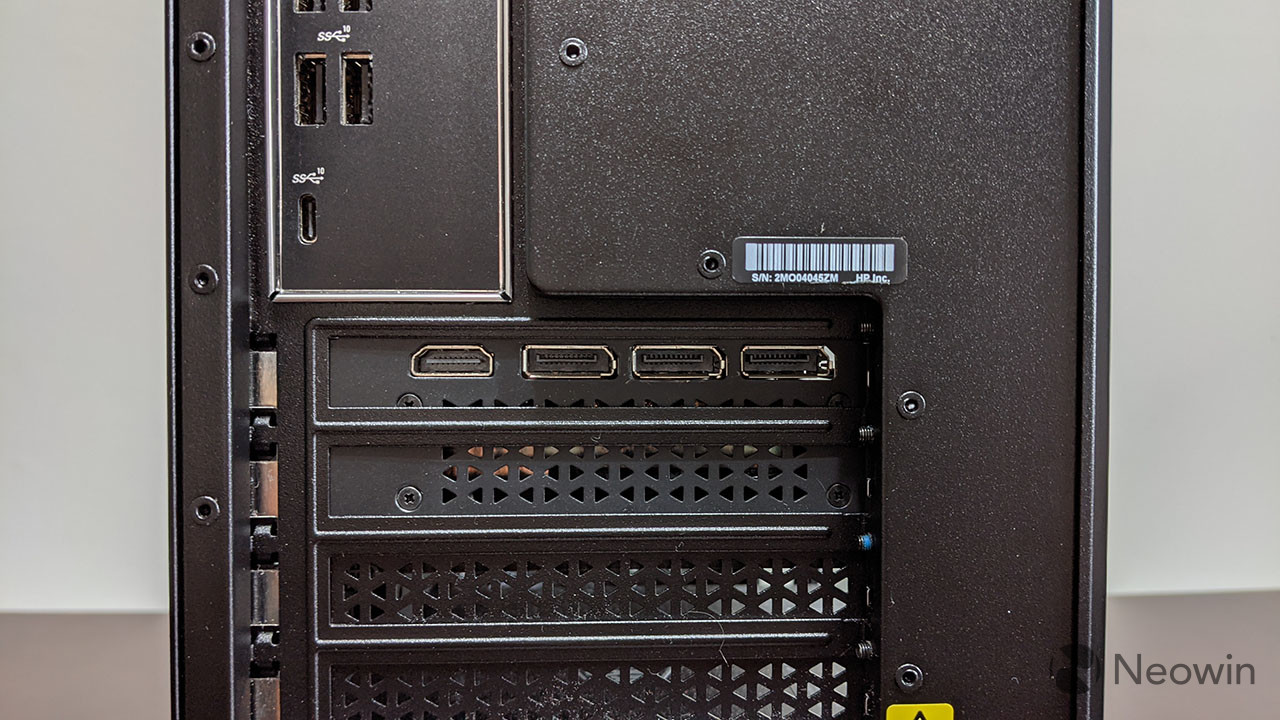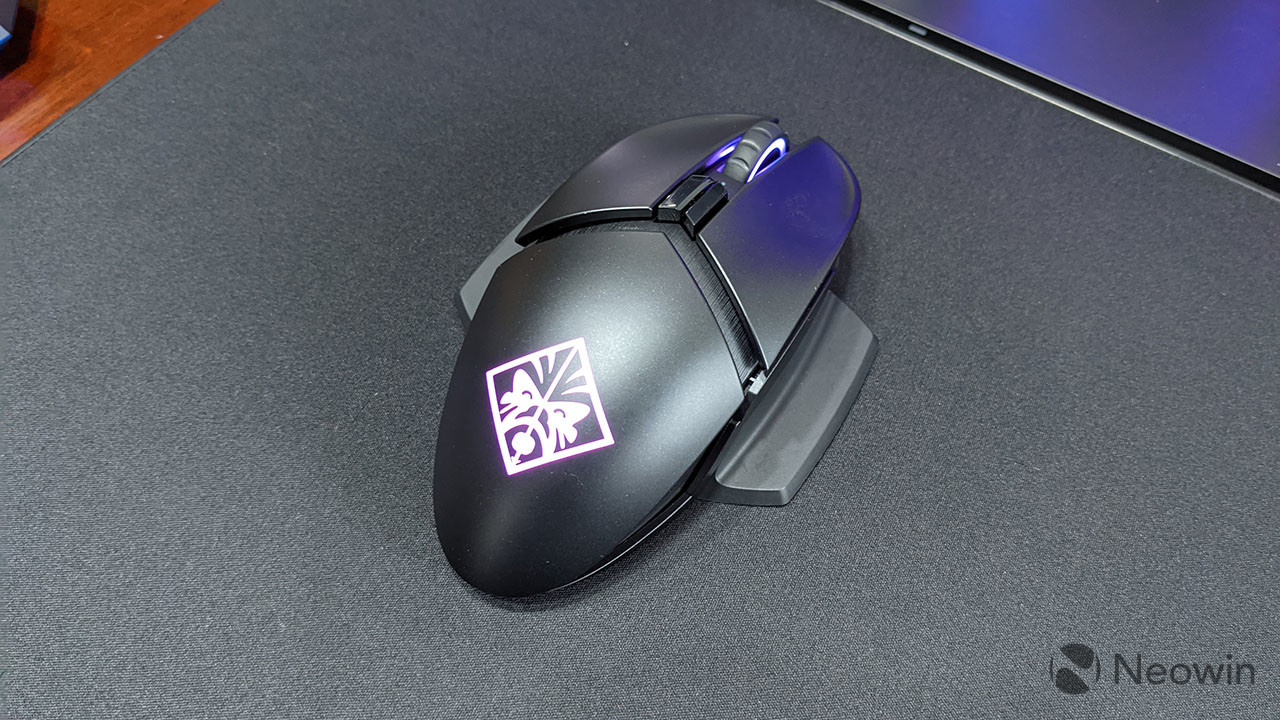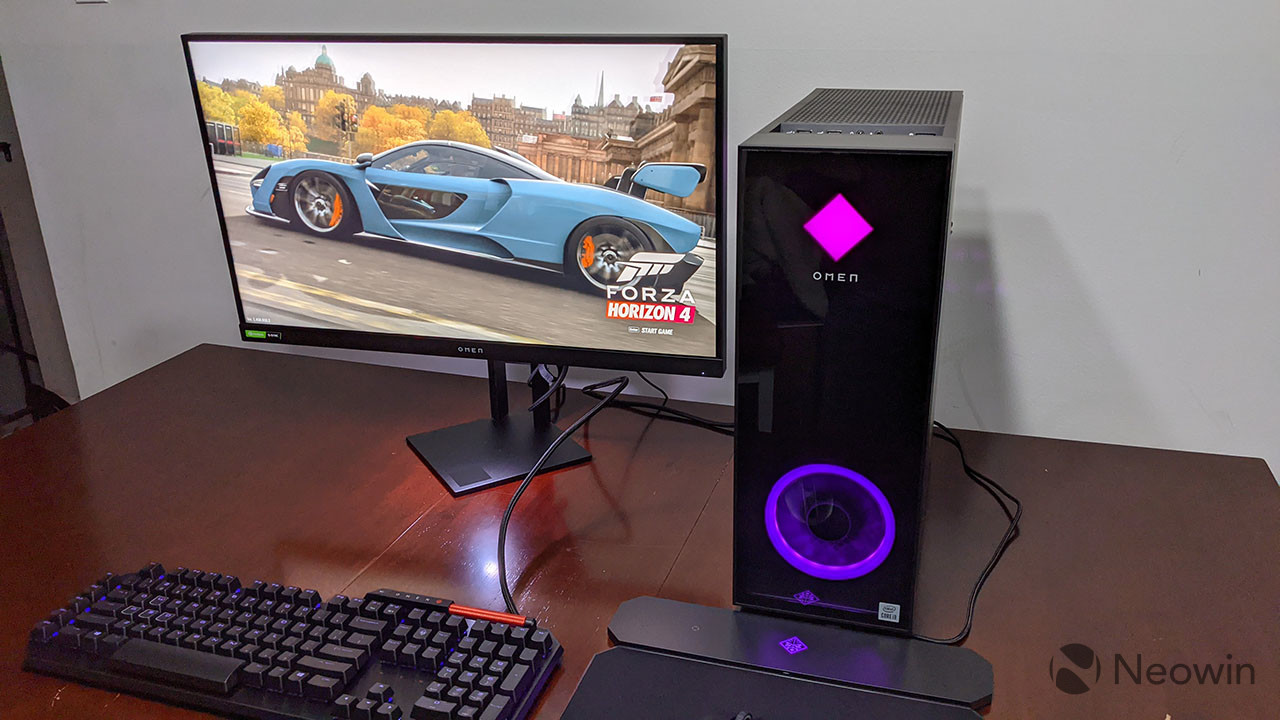HP's OMEN 30L Desktop is definitely one of the more stylish PCs out there, and definitely one of the cleanest-looking gaming rigs. I open with that because frankly, it's among the most important features.
Sure, this thing is powerful. It has Intel's Comet Lake S processors, and in the one that HP sent me, it has a Core i9-10900K. It also comes with Nvidia's GeForce RTX 3080 GPU, so there's a ton of power here. However, those are off the shelf parts that you can get in any new gaming PC. The things that are actually going to get you better performance over the competition are things like thermals, faster memory, and faster storage.
Specs
| CPU | Intel Core i9-10900K, 3.7GHz base, 5.3GHz Turbo Boost, 10 cores, 20 threads, 125W, 20MB L3 cache |
|---|---|
| Chassis | 43.31x16.51x42.4cm (17.05x6.5x16.61in), 12.86kg (28.35lbs) |
| Motherboard |
DoradoOC-AMP, Micro ATX, Intel Z490, 4xDDR4 288-pin memory sockets, LGA 1200, one PCIe x16 Gen 3 socket (for discrete graphic card), one M.2 socket 1 key A, two M.2 socket 3 key M |
| GPU | Nvidia GeForce RTX 3080 with 10GB GDDR6 |
| RAM | 32GB HyperX DDR4-3200 XMP RGB SDRAM memory (4x8GB) |
| Storage |
2TB PCIe NVMe TLC SSD |
| Front ports | (2) USB 3.2 Gen 1 Type-A (1) 3.5mm headphone/microphone jack (1) 3.5mm microphone jack |
| Rear ports |
(1) RJ-45 Ethernet GPU: |
| PSU | 750W Platinum |
| Networking |
Intel Wi-Fi 6 AX201 (2x2) and Bluetooth 5 combo |
| OS | Windows 10 Home |
| Price | $3,109 |
Specifically, this is the HP OMEN 30L GT13-0093. You can find out more here.
Design
When it comes to design, there's a lot to unpack here, at least for something that's a big box. It's not just style, but we have to look at RGB lighting, thermals, cabling, ports, upgradability, and more.
Style is important too, of course. You'll want a PC that matches who you are. The OMEN 30L has a very clean, minimal design, and it shows through the glass front panel. Behind that is the new diamond OMEN logo, which is lit up with RGB lighting, and also behind glass is a big, RGB fan. That fan is actually utilizing a grille on the sides, as it's located in a larger chamber behind the glass.

There are two other RGB lighting areas inside of the desktop. One is inside of the chassis, on top. The other is the four sticks of HyperX memory that's included. While you can control all of the lighting through the OMEN Gaming Hub, you won't be able to get the HyperX memory to sync up with the rest of the desktop.

All of that can be seen through the glass panel on the side. What's even better about that glass panel is that just like on the OMEN Obelisk that I reviewed last year, there's a button on the back that lets you pop it off without any tool. In fact, this PC is meant to make it nice and easy for you to do as much as possible without having to use a screwdriver. After all, if you buy a desktop, you'll want to add and remove parts over time.

One thing that you'll also notice when you look at the internals is that the cabling seems a bit messy. I wonder if this is done on purpose just to make it easier on people that want to do a DIY upgrade of the PSU or something, but it just feels like it could be a bit cleaner.

And then there are the ports. Let's start with the front. The front ports include two USB 3.2 Gen 1 Type-A ports, a 3.5mm headset jack, and a 3.5mm microphone jack. Honestly, I'd really like to start seeing companies go all in on USB 3.2 Gen 2 by now, but HP definitely has not.

That's where the rear ports come in. This machine actually has six USB Type-A ports on the back, and it's the first PC I've ever seen use three different USB standards. Two of the ports are USB 3.2 Gen 2, two are USB 3.2 Gen 1, and two are USB 2.0. Frankly, I'm still surprised to see USB 2.0 in any modern premium PC, and it's upsetting.
But in general, I'm not a fan of different USB standards in a device at all. Sure, it saves the OEM money, but it makes the experience so much more confusing for the user. There are plenty of peripherals - modern webcams are a great example - that will have extremely limited functionality, if any, in a USB 2.0 port. If you're not familiar with the different USB standards, you'll probably try a range of troubleshooting steps before trying a different port.
There's also a single USB Type-C port, which is USB 3.2 Gen 2. Note that Gen 1 will get you 5Gbps speeds while Gen 2 gets you 10Gbps. HP sent over its whole ecosystem of peripherals, so that port was taken up with the USB Type-C port from the OMEN Outpost mousepad. One thing that I'd love to see from tower PCs in general is more USB Type-C. The laptop market is really pushing us toward the newer USB standard, but desktops aren't.

Of course, you'll also find three DisplayPort ports and one HDMI port on the back. This is part of the Nvidia GeForce RTX 3080 GPU, and it's no surprise.

One last thing I wanted to point out is that I've noticed that there's less red. The tubes from the liquid cooling were red on the OMEN Obelisk, as were the memory slots. Red was a signature color for HP OMEN, and HP is moving away from that. The company is moving toward a cleaner look, something first introduced in the OMEN 15 laptop. It's also when OMEN got its new diamond logo.
Cleaner, minimal designs on gaming PCs are something that I'm happy to see becoming a thing across more brands. Gaming PCs have a tradition of being very flamboyant, and there's no actual reason that it has to be that way.
HP used to break up gamers into three categories: casual (Pavilion), performance (OMEN), and enthusiast (OMEN X), and this PC would fall into the enthusiast category. Now there are five groups, apparently. The first two are 'frugal and obsessed' and 'escapists', but this one is aimed at the second two: 'proud gamers' and 'customizers'. The top tier is still enthusiast.
Performance
The HP OMEN 30L includes an Intel Core i9-10900K CPU and an Nvidia GeForce RTX 3080 GPU. It includes 32GB DDR4-3200 memory, a 2TB PCIe NVMe M.2 SSD, and a 2TB HDD. This is my third year in a row reviewing HP's gaming desktop, although it was called the OMEN Obelisk previously. Last year's model had a Core i9-9900K, an RTX 2080 Ti, 64GB DDR4-2666 memory, two 512GB PCIe NVMe M.2 RAID 0 SSDs, and a 2TB HDD. Finally, the previous year's model has a Core i7-8700, a RTX 2080, 32GB DDR4-2666 RAM, a 512GB PCIe NVMe M.2 SSD, and a 1TB HDD.
I laid out all of those specs because each of those areas are seeing a meaningful improvement. The Core i9-10900K is a 125W, 10-core CPU, up from the 95W eight-core CPU in last year's model and from the 65W six-core CPU from the year before. While I called the RTX 2080 game-changing two years ago, now we have Nvidia's brand-new generation of graphics cards with the RTX 3080. One thing that might be a bit overlooked is the faster memory, which was something of a bottleneck in last year's model.

This unit also came with a 2TB SSD and a 2TB HDD. I did not use the HDD at all. Frankly, with this much storage, there's no reason to. I synced my entire OneDrive, installed all of my apps, and still had plenty of room to load it up with games like Cuphead, Forza Horizon 4, Halo: The Master Chief Collection, Microsoft Floght Simulator, Ori and the Will of the Wisps, Tetris Effect: Connected, and Yakuza: Like a Dragon. The SSD is ridiculously faster than the HDD, so if you can get what you need done with 2TB, which is plenty, there's no reason to touch the HDD.
Playing those games on the OMEN 30L is like a dream. Between the powerful CPU, the next-gen GPU, the fast SSD, and the faster memory, things are as fast as they can get, and loading times are virtually non-existent. 4K gaming is a breeze, and of course, you get things like real-time ray tracing.

Notice that I called the GeForce RTX 3080 a next-gen GPU, even though it's now the current generation. That's because nothing is really made for this thing yet, so it's not really going to do anything that my old RTX 2080 Ti can't do; it's just going to do it better and faster, and it absolutely does that. If you want more frames per second, you'll get that.
Of course, you're not going to be upgrading from a GeForce RTX 2080 Ti. That would be silly. You're probably thinking more along the lines of upgrading from the GTX 1000 series, or even something older. At that point, it's totally worth it, because even coming from a GTX 1080, your games will look and feel better.
For benchmark, I used things like PCMark 8, PCMark 10, 3DMark, VRMark, and Geekbench 5.
| OMEN 30L Core i9-10900K RTX 3080 |
OMEN Obelisk Core i9-9900K RTX 2080 Ti |
OMEN Obelisk Core i7-8700 RTX 2080 |
|
|---|---|---|---|
| PCMark 8: Home | 5,472 | 4,731 | 4,562 |
| PCMark 8: Creative | 7,691 | 7,025 | 6,495 |
| PCMark 8: Work | 4,169 | 3,683 | 3,584 |
| PCMark 10 | 7,463 | 7,137 | |
| 3DMark: Time Spy | 16,553 CPU: 13,755 GPU: 17,170 |
11,811 CPU: 10,631 GPU: 12,048 |
|
| VRMark: Orange Room | 14,723 (320.96fps) | 11,116 (242.34fps) | |
| VRMark: Cyan Room | 15,146 (330.18fps) | 12,474 (271.94fps) | |
| VRMark: Blue Room | 5,223 (113.87fps) | 4,311 (93.99fps) | |
| Geekbench 5 | 1,365 / 10,933 | ||
| Cinebench | 1,312 / 15,266 |
None of the benchmarking results are really a surprise, and the results kind of speak fpor themselves. One thing I'll point out is that this is actually the first test I've seen meet the 109fps target frame rate in the VRMark: Blue Room test.
Also, the 'K' suffix on the CPU model indicates that it's unlocked for overclocking, and that's one of the many functions of the OMEN Gaming Hub app. you can run a benchmark in the app, and then it can give you some easy ways to overclock the CPU. None of the benchmarks above were run while the CPU was being overclocked.
Peripherals
As I mentioned, HP sent me the whole OMEN ecosystem, including the Mindframe Prime Headset, the OMEN Outpost Mousepad, the OMEN Photon Mouse, the OMEN Sequencer Keyboard, and the OMEN 27i monitor.

But let's start by assuming that you don't have hundreds upon hundreds of dollars extra to spend after buying your very expensive PC out of the gate. It does come with a keyboard and a mouse, and like most keyboard and mouse combos that ship in the box with a PC, they're pretty basic.

They're both wired, and they get the job done for typing. Neither are particularly good at gaming, of course. The mouse is so light that it feels like there's nothing inside, and the chiclet-style keys on the keyboard don't have that instant response feel that gaming keyboards have.

The point is that these exist because they have to. For some reason, companies still ship a mouse and keyboard with new desktop PCs, and it's usually the cheapest ones that they can make. It's just enough to make the PC usable out of the box and nothing more.

Now, if you get a bit extra money to spend, you may start looking for more than what's in the box. Let's start with the OMEN 27i monitor, as a screen is something you definitely do need. This is a 27-inch monitor that offers a 165Hz refresh rate and 2560x1440 resolution. Personally I love it, along with its minimal style.
I also just think that QHD is just the right resolution for almost everything, and it's not nearly as popular as it should be. On a laptop, it's the right balance between a high resolution and battery life. For a gaming display, it's the right balance between a high resolution and a high frame rate. I was super-pleased using this screen for everything, from work to play.

Another product that I enjoy is the OMEN Outpost Mousepad. It's nice and big, and it has a wireless charging pad at the top. As I mentioned earlier, you do have to plug it into the PC's one USB Type-C port, but it also comes with its own USB Type-A port which is great for plugging in peripherals.

I'm a big fan of the OMEN Mindframe Prime Headset. It's a gaming headset and the focus is to keep your ears cool and comfortable. And if you're wondering where to put it while you're not using it, you can just hang it on the stand that's built into the OMEN 27i monitor.

Then we have the OMEN Photon Mouse, which is actually a Bluetooth mouse that's designed for gaming. I know, I was skeptical too. It's pretty great though, and you can charge it wirelessly right on the OMEN Outpost Mousepad. If you don't like a wireless mouse though, you can also just plug it in with a wired connection in the USB Type-A port on the Outpost.

Finally, we've got the OMEN Sequencer Keyboard, which has RGB lighting in user-customized zones, five macro keys, and more. It even has a wheel in the top-right for adjusting the volume.
Conclusion
I thoroughly enjoyed the OMEN 30L Desktop, just like I've enjoyed its last two predecessors. I also really appreciate just how much effort HP has put into improving it over the years. The thing that really catches my eye this year is the refined design, and that's something that I appreciate across the whole lineup. It's a nice touch.

While I love the OMEN 30L, it's not perfect. It's particularly offensive that there are USB 2.0 ports, especially when the OMEN Obelisk didn't have them (it still had six USB Type-A ports, but they were all USB 3.x). I'd also have liked to see a bit tidier cabling, but to be honest, that's probably something that you wouldn't even notice if I didn't say anything. Also, I'd have liked to have seen this come with 16GB sticks of RAM instead of 8GB, as it's just more expensive to upgrade to 64GB this way.
The performance is great with Intel's top-end K-series CPU and Nvidia's latest GPU. HP improved thermals too, increasing the height of the PC for better airflow and more. Indeed, thermals affect performance as much as anything else. It also comes with faster memory and a larger SSD.
This is an awesome PC, and it's a really pleasant one to keep on your desk. It's nice and easy to access the internals, HP has a great OMEN ecosystem, and most importantly, games play great.





































12 Comments - Add comment